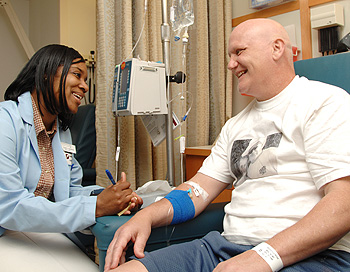Medically reviewed by Clare Sullivan, BSN, MPH, CRRN
It’s well known that many chemotherapy medications used to treat cancer can bring undesirable side effects, such as hair loss, lack of appetite, and fatigue. But experiencing such symptoms is not an indication of whether cancer treatment is working.
How does chemotherapy affect cells?
Chemotherapy interferes with a cell’s ability to grow and divide, so it tends to kill rapidly dividing cells, such as cancer cells. However, some normal cells in our body also divide rapidly, such as hair cells and cells that create the stomach lining. Whether or not you will have side effects during cancer treatment depends on a variety of factors, including your overall health, the drug dosage, and the types of medication you take. A number of chemo drugs, for example, don’t cause hair loss because they are better able to target cancer cells – not healthy cells.

Why do different chemo drugs have varying side effects?
Doctors can choose from more than 100 different chemo drugs, used in many combinations, to treat specific types of cancer and related diseases. All of these medications and drug combinations come with their own unique set of side effects, which can vary from person to person. Some patients report only relatively minor side effects that last a short time during chemo treatment, while others may have more serious complications. But these side effects have nothing to do with whether a treatment is working.
How is the effectiveness of chemotherapy determined?
To best determine whether a certain treatment is effective, doctors rely on a variety of imaging scans, blood tests, and related screenings. For example, physicians often use scans such as magnetic resonance imaging, computed tomography (CT), and PET/CT scans to determine whether cancerous cells have spread. For certain cancers, doctors may use a blood or urine sample to check for tumor markers, which are substances that may indicate specific types of cancer when found in increased levels in the body.
What happens to chemotherapy side effects after treatment ends?
The good news is that most side effects gradually go away when cancer treatment ends and healthy cells have a chance to regrow. Your health care team will work with you to find ways to help you avoid or minimize side effects if they do occur.
